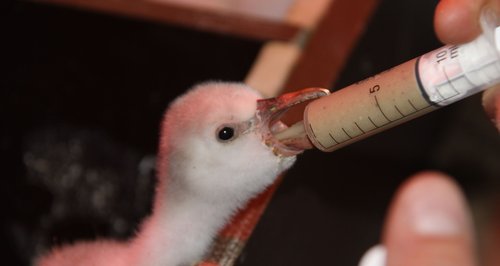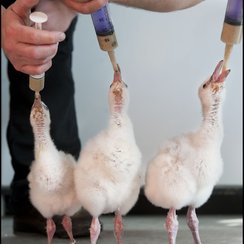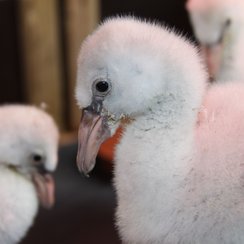Flamingo Chicks Hand Reared At Longleat
11 September 2013, 13:29 | Updated: 11 September 2013, 13:37

Five flamingo chicks are having to be hand reared by keepers at Longleat Safari & Adventure Park after the eggs were abandoned by their parents during a thunderstorm.
Keepers at the Wiltshire wildlife park are using syringes to feed the endangered Chilean flamingos after all the eggs were artificially hatched in an incubator.
Adult flamingos build a volcano-shaped nest and lay a single egg, which they then usually sit on for around a month. However a violent thunderstorm is believed to have caused the parents to simultaneously abandon their nests and forced keepers to intervene.
“It’s extremely unusual for all the parents to abandon their eggs at the same time, however the storm was particularly severe and the adults decided to head for cover – leaving us to look after the eggs,” said Longleat’s Mark Tye.
“We carefully removed them from their nests and put them into an incubator, where they started hatching out within a week. The chicks are now almost a month old and doing extremely well, although they are keeping us busy as each one has to be fed up to five times a day,” he added.
Flamingos lay a single egg on top of a tall cone nest. All chicks are born with white plumage, which they keep for around three years, and a straight bill which gradually droops down as the bird grows. Fully grown they are around a-metre-and-a-half tall, and can weigh anywhere up to seven kgs. They live 15-20 years in the wild, however in captivity, and safe from predators, they can reach ages of 70 years.
The Chilean flamingo can survive at high altitude in the Andes mountains. They are also significantly more cold-hearty than their Caribbean counterparts. In the wild flamingos eat small crustaceans and other microscopic animals and plants which are obtained by filter feeding.
When adult, the continuously moving beak acts as an efficient filter for food collection when water is pumped through the bristles of the mouth.
At Longleat they eat a special flamingo diet that contains pigments essential for maintaining their distinct colour. The name flamingo came from the Latin word for flame. The Romans considered flamingo tongues a delicacy.

